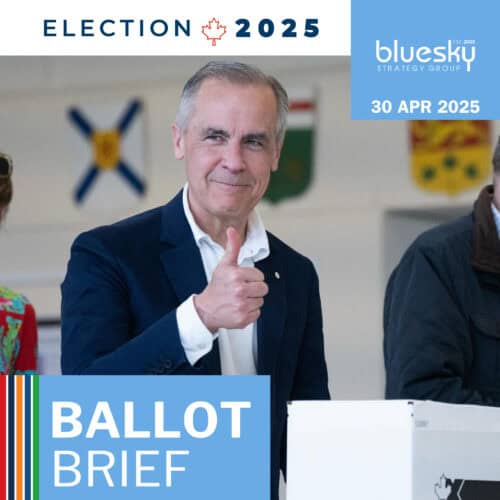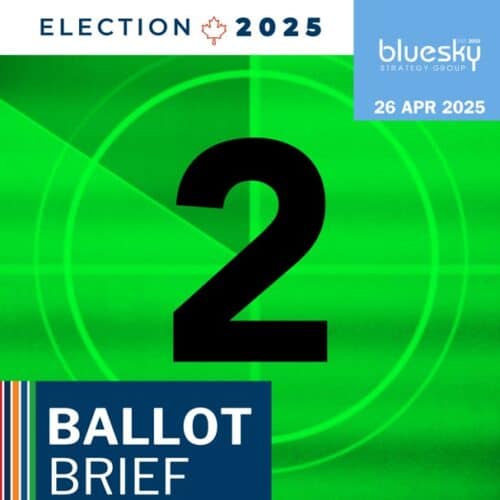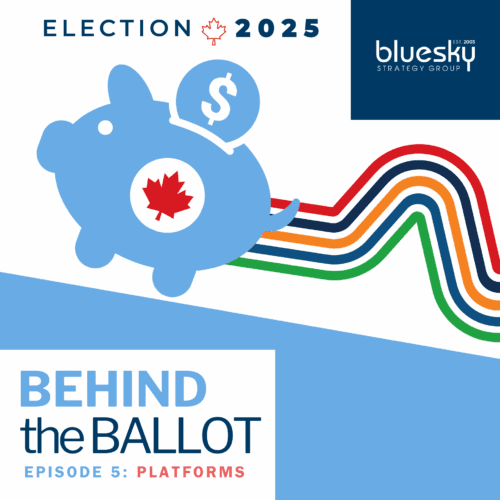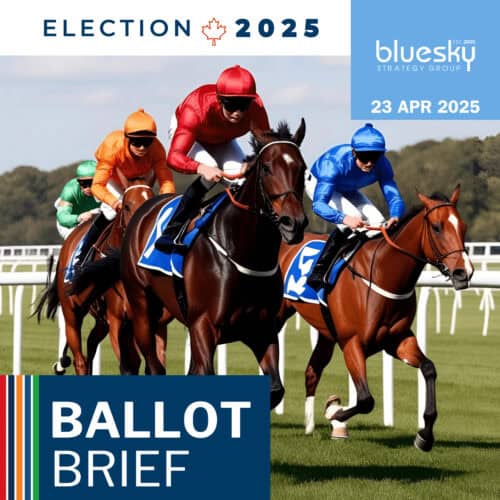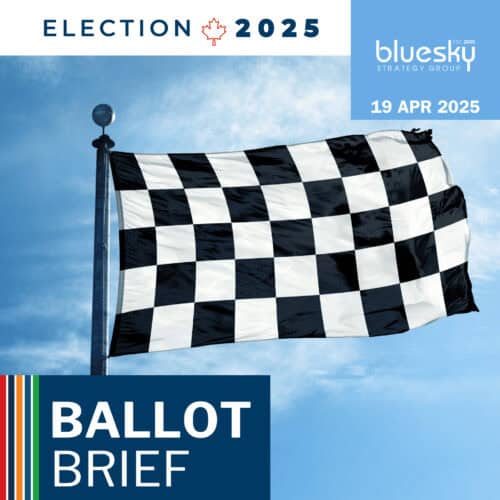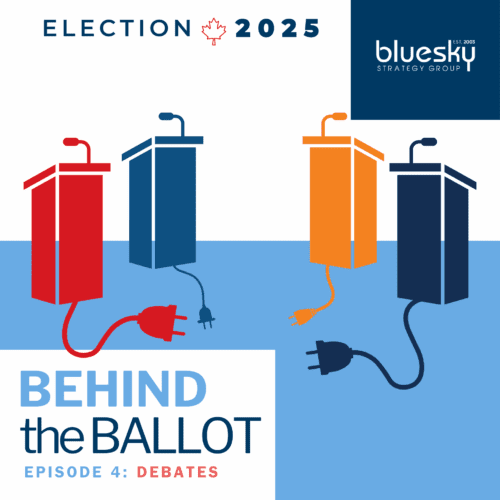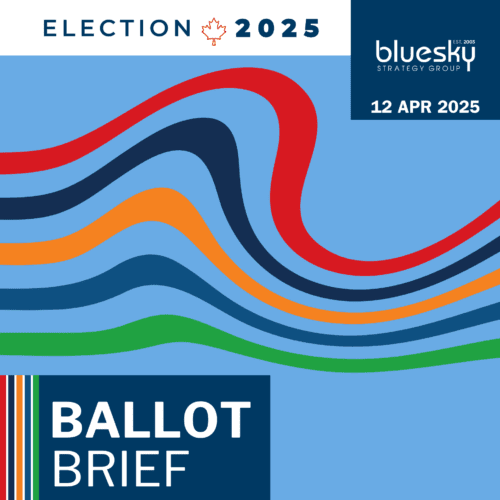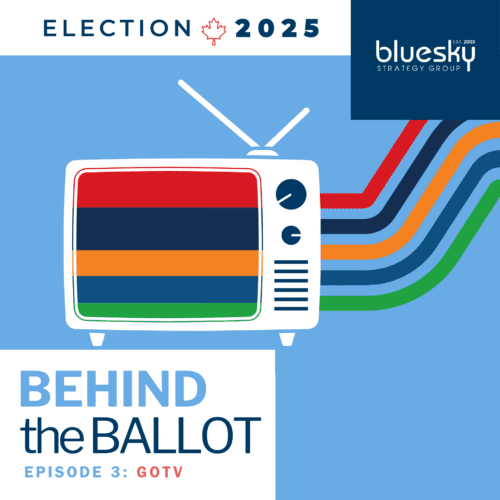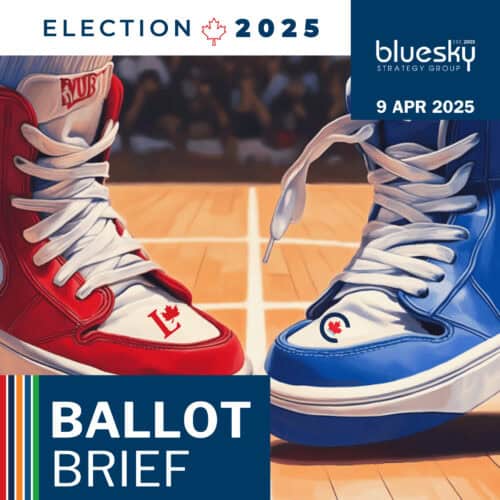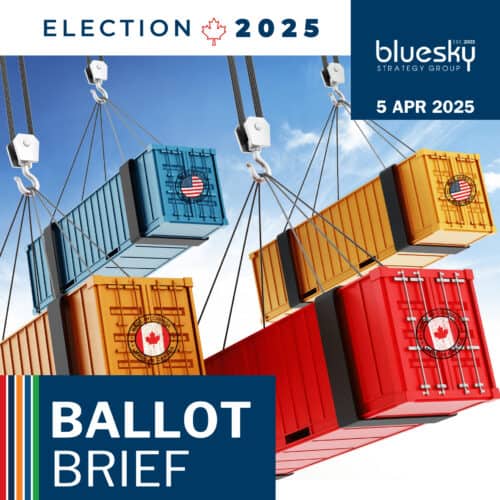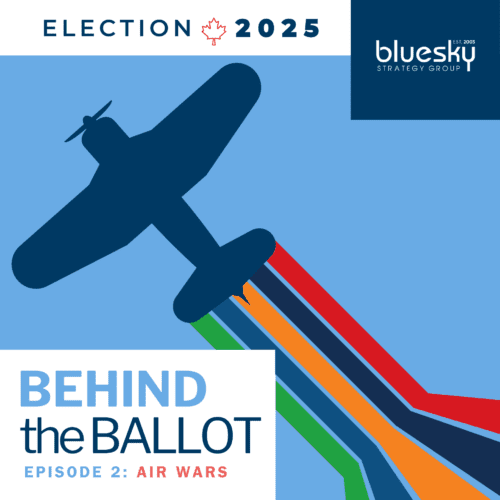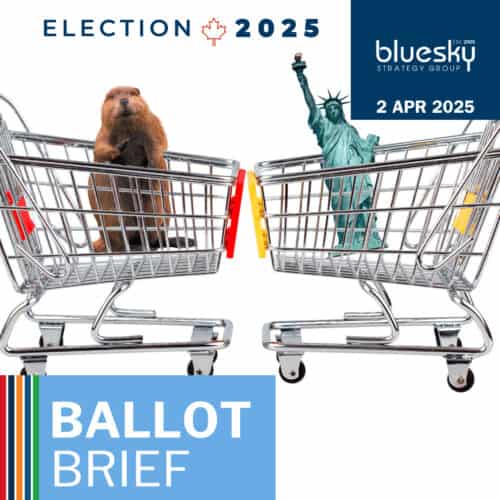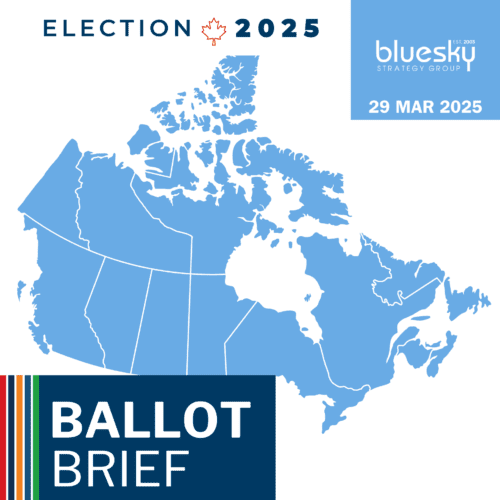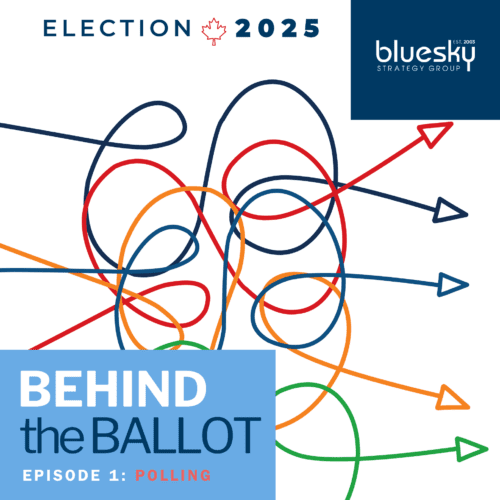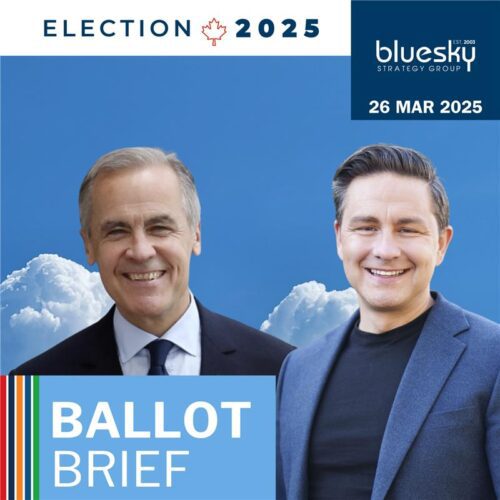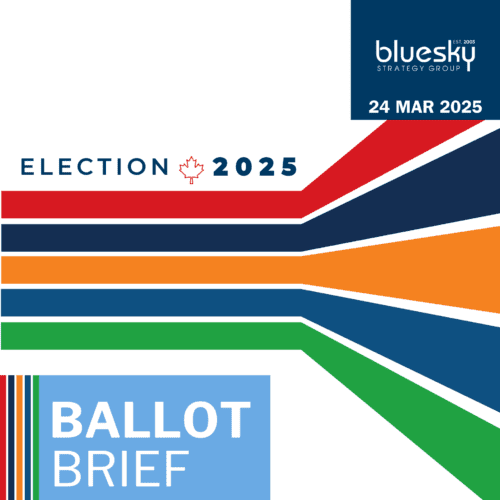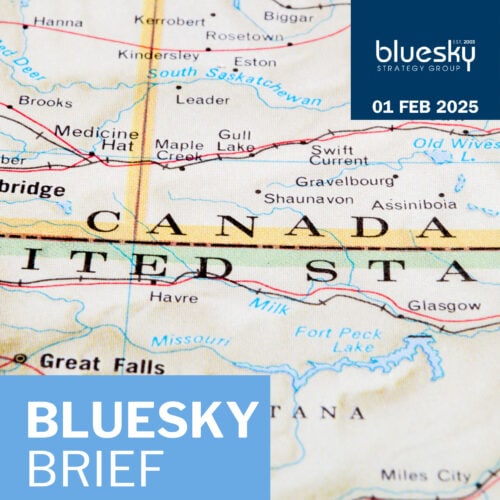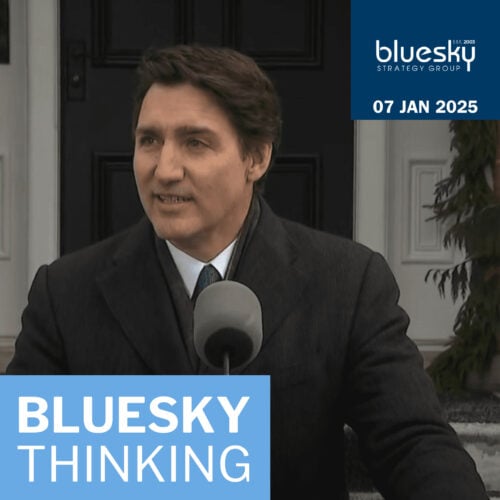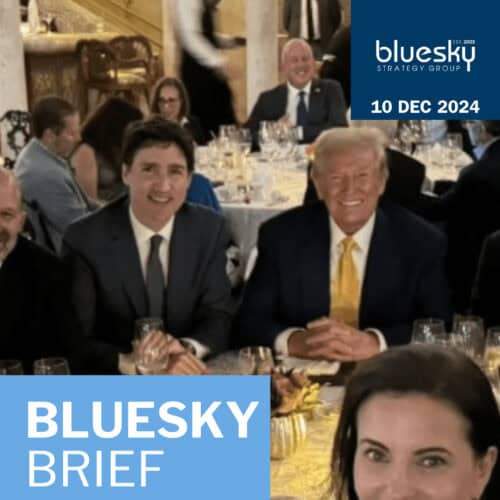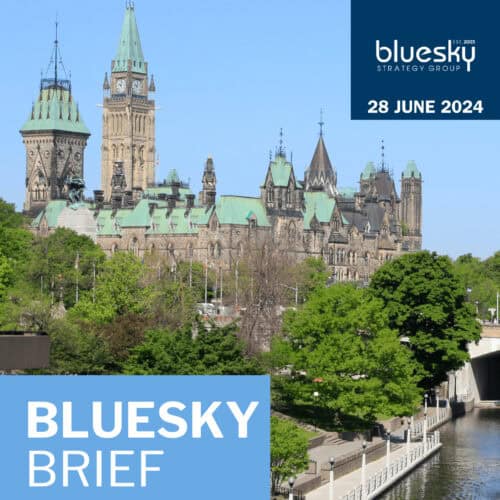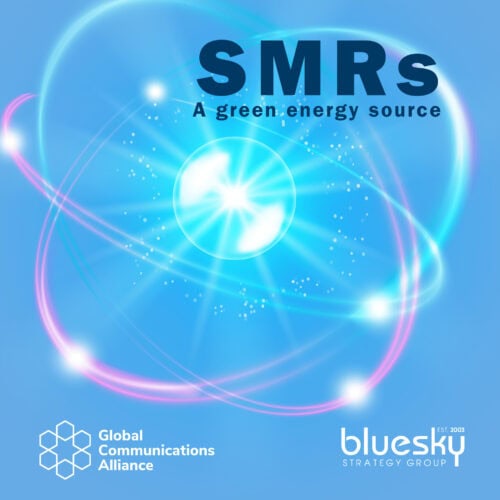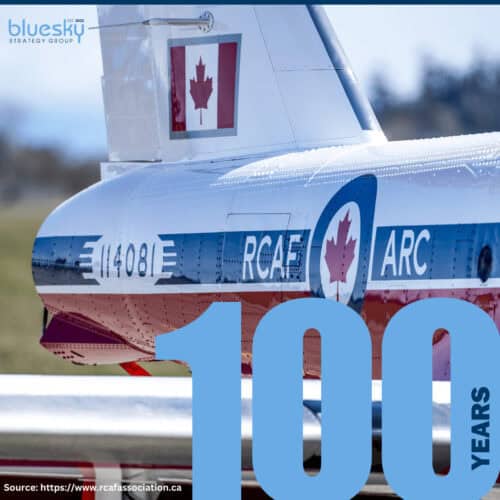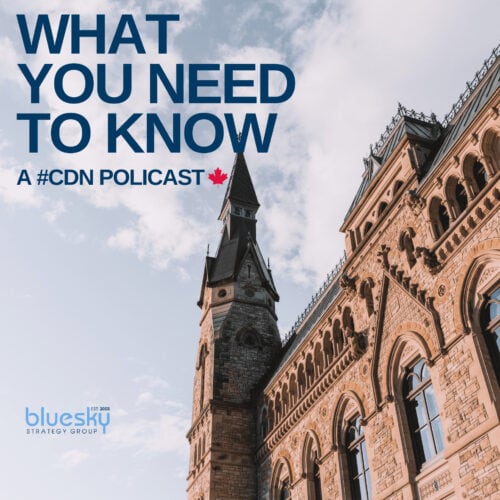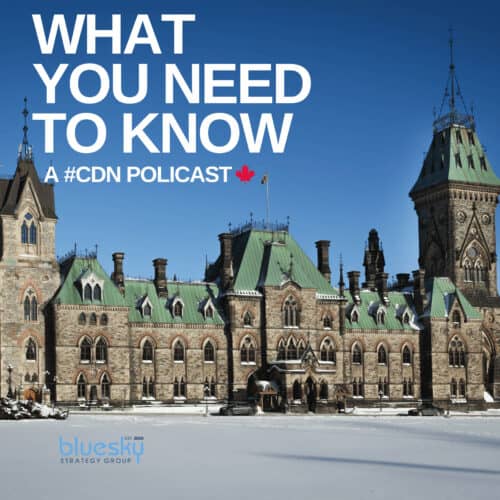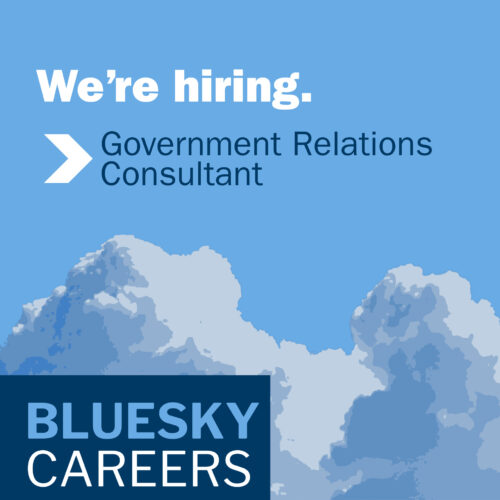The Rundown
Here’s a recap of the key campaign announcements since our last Ballot Brief.
Auto Jobs on the Line – Liberal leader Mark Carney and NDP leader Jagmeet Singh unveiled plans to shield Canadian workers, strengthen local production, and hold U.S. companies accountable.
Canada First TFSA Top-Up – Conservative leader Pierre Poilievre proposed allowing Canadians to contribute an extra $5,000 annually to their TFSAs for investments in Canadian companies, aiming to strengthen the economy.
Everybody’s Cutting Taxes – The NDP targeted cuts for families and essentials, while the Greens co-leaders proposed a $40,000 tax-free threshold to help 78 per cent of Canadians. Last week, both Conservatives and Liberals proposed personal income tax reductions. Affordability is a top concern.
Can’t Touch This – Before the election call, the government expanded the next phase of dental care. Poilievre pledged Thursday that he would maintain the social program along with a $10-a-day child-care program and pharmacare benefits, for those “who has them.”
Protect Quebec – Bloc Québécois leader Yves-François Blanchet vows that his party will fight for Quebec’s aerospace industry, demanding fair policies, defence reinvestments, and a national strategy to protect and grow the sector amid economic challenges. The Bloc also called for a wage subsidy to protect Quebec workers and businesses from the growing economic threats posed by Donald Trump’s policies.
Tougher Sentences – Poilievre pledged to introduce life sentences for the most serious repeat offenders, including fentanyl traffickers, large-scale gun smugglers, and those convicted of multiple human trafficking charges. The proposal is part of his broader pitch to address rising violent crime and drug-related deaths in Canada.
Supply Protection – The Bloc demanded that all parties adopt a bill to safeguard Quebec’s supply management system before summer 2025, ensuring no future trade loopholes.
Building Trade – The Liberals unveiled a $5 billion plan to strengthen Canada’s trade infrastructure, diversify trade partners, and create jobs amid rising tariffs.
The Inside Track
- How much of the next week will the Liberals spend governing and reacting to real-world events, rather than sticking with the campaign and message plan? The Liberals have the double-edged incumbent advantage. They get to “suspend campaigning” to stand before Canadians with their government hat on, making – and being seen to make – the tough calls and deliver the tough responses. But it’s not just for show – these situations, decisions and actions are high stakes with generational risks. With April 2 around the corner, will Carney’s campaign plane have to cool its jets for a week or more?
- Meanwhile, the Conservatives and Poilievre in particular, are under mounting pressure to do more to respond to the U.S. presidential pressures sending shockwaves through all Canadians. For now, they’re sticking to the campaign game plan, choosing to conduct rallies, speeches and events with only a modicum of talk about the Republican elephant in the room. The NDP just generally continue to struggle for relevancy amid the crisis gripping the public and evaporating voter support. The NDP are speaking directly to their core constituency and values by focusing on struggling workers and individuals rather than the macro lens favoured by the other two leading parties.
- On the campaign side, Carney struggles to move past dogged questions from reporters and insinuations from opponents related to his personal assets and blind trust holdings, plus cold-calculated business decisions taken when he chaired investment firm Brookfield Asset Management. To shut it down, he’ll have to deliver a more pointed response that runs contrary to his preference for measured, careful answers. The other drag on his campaign is his struggle in French and a perceived lackadaisical approach to Quebec, especially for a Liberal party seeking to preserve and gain seats there, principally against the Bloc which every day of the campaign champions Quebec’s interests. While noted, Quebecers do seem to be offering a penalty-free pass for now, given the extraordinary threats of the U.S. administration to the Canadian and Québécois nation(s).
- Poilievre has spent the week trying to focus Canadians back on affordability issues, where Conservatives feel they have an edge over the Liberals. They are sticking to their plan while feeling genuine momentum on the ground. Poilievre has shown his ability to draw unusually large crowds during this stage of a campaign, bringing out over 4,000 in Hamilton and over 5,000 in Surrey recently, both regions where they hope to gain seats. This weekend, Poilievre will head to Winnipeg before going back to the battleground GTA and then making a trip to Atlantic Canada. Expect to see more policy rollout focused on affordability issues over the coming days.
- Singh is digging in as the NDP faces its toughest election yet. He acknowledged “massive challenges” on the trail but vowed not to back down. The NDP secured endorsements from three major unions, including CUPE, the United Steelworkers, and the Amalgamated Transit Union as Singh framed the campaign as a fight for working people against corporate interests. He pivoted quickly to Windsor after news of auto tariffs, stopping by Stellantis’ Chrysler plant to greet workers. The reception was mixed, with some shaking hands and others walking past or voicing support for the Conservatives – a snapshot of the NDP’s growing challenge reconnecting with its traditional working-class base.
South of the Border
The White House may have been distracted earlier this week, facing sharp criticism over a leaked Signal chat in which U.S. Defense Secretary Pete Hegseth shared sensitive operational details of a planned strike on Houthi rebels in Yemen. Despite bipartisan concern in Congress and calls for accountability, the administration has dismissed the incident as overblown, deepening concerns among allies — including Canada — about the security of shared military and intelligence operations going forward.
Perhaps coincidentally, the White House made a surprise announcement of sweeping 25 per cent tariffs on imported passenger vehicles and key auto parts as of April 2. With some exemptions for CUSMA partners based on U.S. content, the move still significantly disrupts North America’s integrated auto supply chain. Carney called the tariffs a “direct attack on Canadian workers” and vowed retaliatory measures, including counter-tariffs on $60 billion in U.S. goods and the acceleration of a $2 billion “All-in-Canada” auto strategy. Auto sector experts predict a massive shutdown of production within weeks in the face of inflexible cost margins and complex supply chains. Carney bluntly said Canada’s era of partnerships with the U.S. – free trade and security – “are over.”
Seeming to cool the situation somewhat, a phone call between Trump and Carney Friday struck a surprisingly conciliatory tone. Trump described the exchange as “extremely productive,” and notably referred to Carney as “prime minister” rather than the dismissive “governor” label he had used with Trudeau. According to readouts from both sides, the leaders discussed trade, security, and the upcoming Canadian election, with Carney pressing for tariff relief and Trump hinting at future exemptions tied to U.S. content thresholds. While no breakthroughs were announced, the tone of the call suggests both leaders are keeping diplomatic channels open — even as the tariff standoff becomes increasingly politicized and as domestic news continues shifting attentions for both leaders.
Hot … or Not?
Bad Company: Continuing on her crusade south of the border, and despite pleas to cancel, Premier Danielle Smith went ahead with her plans to join American conservative commentator Ben Shapiro, at a fundraiser in Florida. Shapiro has made waves in Canada, supporting Trump’s annexation of Canada suggesting this country be referred to as “Puerto Rico of the North.” While the event was private and closed to the media, for what it’s worth, Smith reported she “had a great time.”
Break with the Past: In a surprise move by someone who once stood at the helm of the party, former NDP leader Tom Mulcair penned an opinion piece for Bloomberg, telling Canadians NOT to vote NDP. He argues that Trump’s “very real threat to Canada’s economy and sovereignty” is so grave that the only choice is between the Liberals and Conservatives.
Quebec Oopsies: Liberal Leader Mark Carney has had to apologize for an unfortunate misspeak… to one of his own candidates. When introducing star candidate Nathalie Provost — engineer, gun control advocate and survivor of the École Polytechnique massacre, he mispronounced her name and then identified Concordia, rather than Polytechnique, as the site of the violent incident. A seemingly minor slip, it added up in Quebec — in a week where he struggled at times to speak fluent French and faced criticism for bowing out of the additional TVA French debate.
Security Clearance Clarification: In an interview with POLITICO, former clerk of the Privy Council, Michael Wernick weighed in on Poilievre’s refusal to get top secret security clearance, characterizing the decision as “disturbing.” His concern is that there seems to be a “lack of understanding of the purpose of intelligence gathering and an inability to jump beyond partisanship, to recognize some things are in the national interest.”
Fashion Yarn: Singh has abandoned his bespoke corporate suits for … sweaters? Perhaps in a play to better relate to the working people he is fighting for, Singh has been sporting an array of knits throughout the campaign thus far…
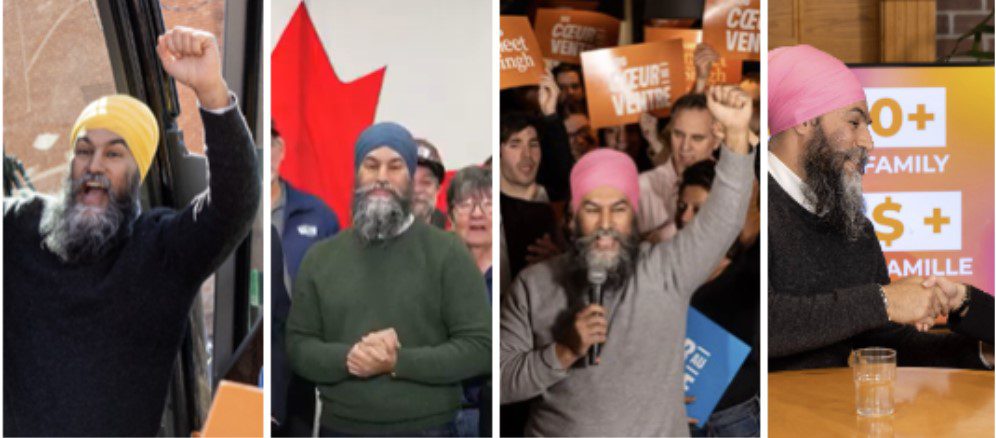
NDP Social Media
Bluesky Bonus
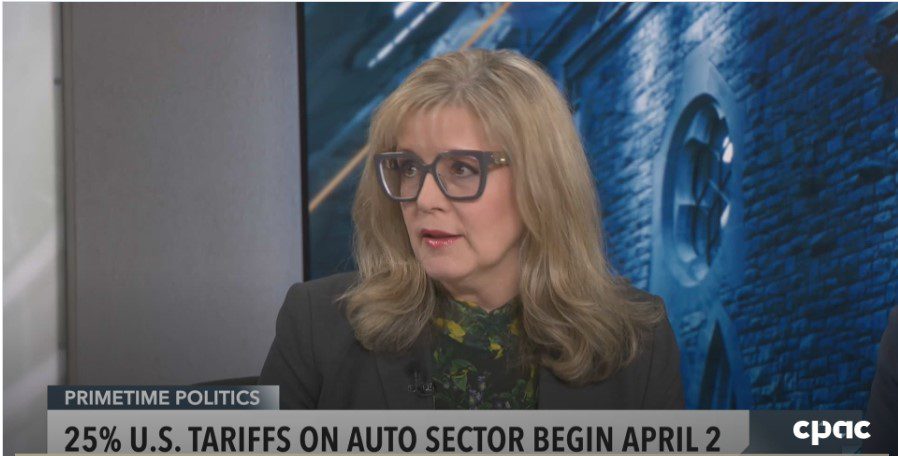
Principal and Co-founder, Susan Smith, joined the strategists panel on CPAC’s Prime Time Politics on Thursday, March 27.
#ICYMI: The premiere episode of our Election 2025 webinar, Behind the Ballot, kicked off with a focus on polling. Senior Consultant Angelo Bakoulas was joined by Aiden Muscovitch, Assistant Editor at The Hub and author of The Week in Polling to unpack whether federal polls are measuring voter sentiment — or shaping it.
Behind the Ballot, Episode 2 will be presented live at 12 noon ET on Thursday, April 3. Vice-President Jordan Paquet will be joined by freelance journalist Teresa Wright as we take a look at “the Air War” on media, messaging and mobilization.
Register and block off your calendars for next week!
Today’s Bluesky Ballot Brief was brought to you by the team of Stuart McCarthy, Geoff Turner, Janice Nicholson, Jordan Paquet, Alyson Fair, Angelo Bakoulas, Manuela Boeira, Emily Szemethy, and Nolan Pratt.
